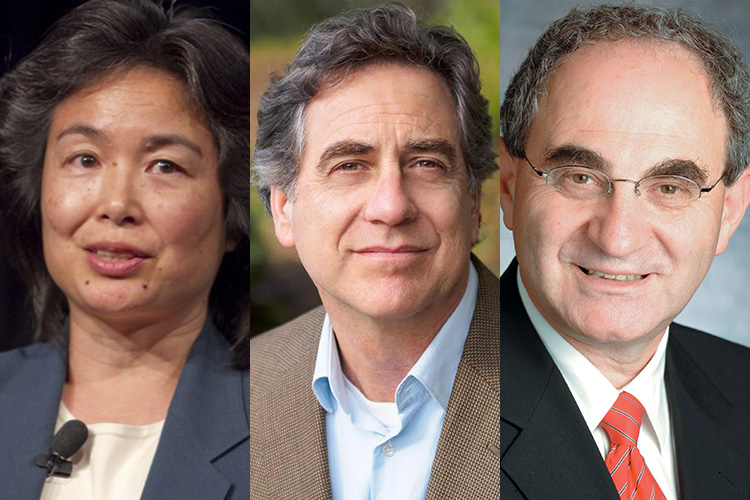Three innovators elected to National Academy of Inventors

Three UC Berkeley faculty members – Tsu-Jae King Liu and Eli Yablonovitch of electrical engineering and computer sciences and Daniel Portnoy of molecular and cell biology and public health – have been named fellows of the National Academy of Inventors, an organization that champions the societal benefits of university research.
The three were among 155 new fellows announced today who together account for nearly 6,000 U.S. patents.
Liu, the TSMC Distinguished Professor in Microelectronics and a member of the Kavli Energy Nanosciences Institute at UC Berkeley, has contributed over her career to many developments in semiconductor devices and technology and co-invented, with UC Berkeley’s Chenming Hu, the FinFET transistor (fin field-effect transistor), which is used today in leading-edge integrated circuits. She was instrumental in demonstrating the reliability and scalability of FinFETs, and presently holds 94 patents and an additional 80 patents pending in the field of semiconductor devices and fabrication methods. Thirty-seven of her issued patents were assigned to a company she cofounded, Progressant Technologies, Inc., which was acquired by Synopsys, Inc.
Portnoy, the Edward Penhoet Distinguished Chair in Global Public Health and Infectious Diseases, is a leading expert on the food-borne pathogen Listeria monocytogenes, which serves as a model for other more dangerous bacterial diseases. His pioneering research on microbial pathogenesis has led to cancer immunotherapies, vaccine discovery and vaccine development platforms. He holds 19 U.S. and eight international patents, and has over 25 patent applications pending. Many of his patents have been licensed to biotechnology companies, where his inventions are being translated into cancer immunotherapeutics and novel vaccine discovery.
Yablonovitch, director of the multi-university National Science Foundation-funded Center for Energy Efficient Electronics Science, is a pioneer in optoelectronics, the technology that makes high-speed internet communications possible. He championed the use of strained semiconductor lasers in today’s optical telecommunication and coined the term “photonic crystal” – an artificial structure that manipulates beams of light in the same way that silicon and other semiconductors control electric currents. His startup company Ethertronics Inc. has shipped over 1.7 billion cellphone antennas, and Luxtera Inc., a company he cofounded, is the originator and world leader in silicon photonics.
UC Berkeley now has 14 living fellows in the National Academy of Inventors, including Paul Alivisatos, Jennifer Doudna, Amy Herr, Chenming Hu, Enrique Iglesia, Jay Keasling, Michael Marletta, Richard Mathies, Jasper Rine, George Smoot, and Paul Wright. The late Charles Townes was also a fellow.
